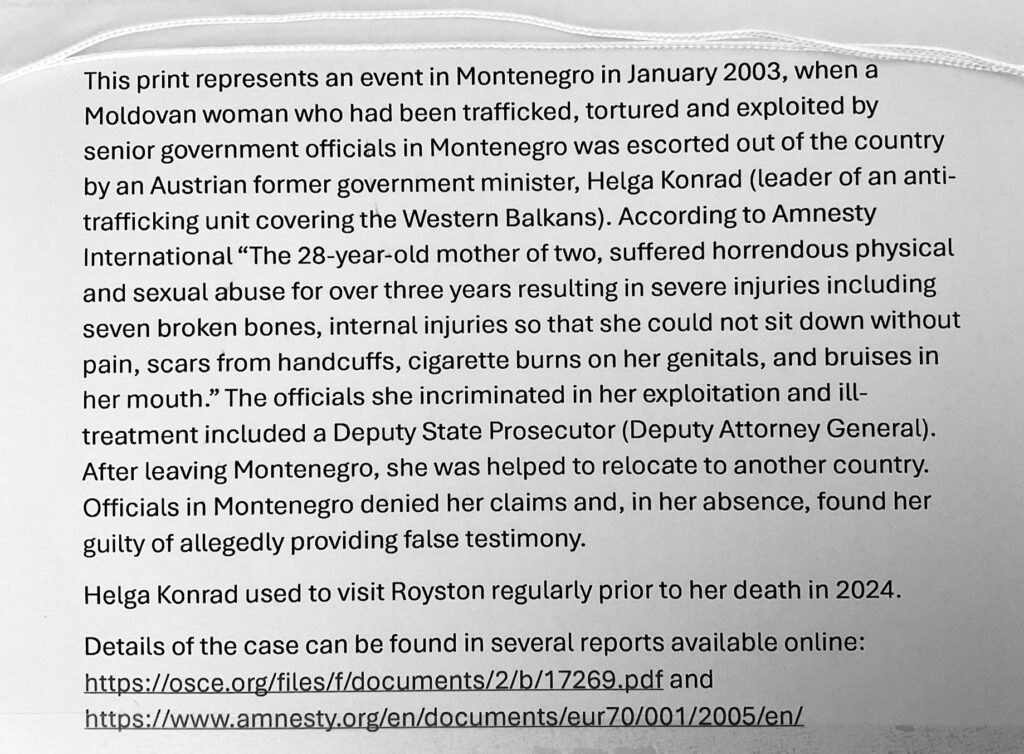
Note the date of the upcoming CEIPA/PAYOKE ZOOM roundtable conference – “New Challenges for Civil Society in Times of Growing Human Rights Erosions”
See list of Speakers and Panellists to be confirmed shortly.
This event will honour the work and achievements of Dr Helga Konrad, an ever-active advocate of rigorous safeguards of human right principles. Former federal minister in Austria, chair of the EU Stability Pact Task Force on Anti-Trafficking for Southeastern Europe, the OSCE’s first Special Representative on Combating Trafficking in Human Beings and the coordinator of the Regional Implementation Initiative are a few of the roles she played on the European and international levels.
Her unique ability and political instinct substantially contributed to new initiatives in Europe, to the creation of various international bodies dealing with social justice and human rights, to strengthening intergovernmental dialog on human right and social justice, as well as cementing cooperation between governments, parliaments, unions, NGOs and think tanks.
Helga Konrad died unexpectedly on 8 October 2024 in Vienna, just a few days after chairing and directing an international conference under the moto:
“Countering the Toxic Interface of Migration”
The CEIPA/PAYOKE ZOOM Conference 20 November 2025 will follow the path of Helga Konrad’s legacy.
Subject of the discussion by the panellists
To critically examine the increasing erosion of human rights, as well as the weakening of international and European human right instruments, that provide the bedrock upon which democracy is built. Also, addressing the shrinking space for NGOs and mandated organisations dealing with human right issues and in particular within protection of victims of human trafficking.
This CEIPA/PAYOKE event will foster the critical dialogue about upholding the commitment and the accountability of governments, parliaments and international institutions with regards to fulfilling their mandate and obligations in defending human rights and civil liberties.
Are our governments, parliaments and democratic institutions strong enough to withstand and resist the pressures from populist nationalist leaders, governments and political groupings?
The CEIPA/PAYOKE video conference will take place on:
Thursday
20 November 2025
Between 2 and 4pm (CET)
In order to speak about the legacy and the work of Dr Helga Konrad, one ought to see the wide range of issues relating to the evolving concept of human rights in Europe.
The aftermath of World War II has laid down the architecture and functioning of universal principles of human rights and civil liberties. A great number of binding and less binding global and regional legal instruments have been created since. During the 80 years of relative stability and economic growth worldwide, especially in Europe and North America, numerous legal instruments and human rights institutions have been created on regional, national and global levels, respectively. Europe became a continent of steady democracy respecting the rule of law and a hub of economic wealth and prosperity. Thus, the old continent became a champion of human rights and a soft world power of our times.
A new generation of policy makers and political leaders emerged whose background was rooted in the transformation movements of the end of the sixties and reinforced after the fall of the Berlin wall. One of them was Dr Helga Konrad, who began her political career in the late sixties in Graz and hitherto expanded her influence to strengthening human rights policies and structures on national, European and international levels. Her efforts over the years concentrated on strengthening international instruments, extending the provisions for rights of women and protecting the victims of social injustice – in particular victims of human trafficking. Her political career was marked by moral and ethical principles denouncing heavy breaches of human rights and creating a fresh protective space for victims of human trafficking. Breaches of human rights must not be let in impunity was her often recalled statement.
Due to Helga Konrads efforts and influence a great number of initiatives and instruments, as well as functional networks have been created in Europe.
Her grave concern was the erosion of human rights inconspicuously capturing parts of Europe and beyond. She vehemently opposed the rise of authoritarianism and populism, the surge in far-right populist movements threatening European democratic governance and the rule of law, with all her conviction. The emergence of new political parties and groupings fuelling discrimination and xenophobia, in particular against marginalized groups such as migrants and victims of trafficking, reinvigorated her commitment towards new initiatives. Her annual roundtable discussions organised with the appreciated support of the Austrian government, though primarily dealing with the issue of human trafficking, were consequently planted in the overall human right situation prevailing in Europe. She felt obliged to contribute personally to fostering inclusive democratic societies and to help counteract the newly emerging populist movements weakening the protective space extended to victims of human trafficking.
The increasing use of artificial intelligence and surveillance technologies when used to disempower victims and NGOs has also been addressed during her annual round table events.
This CEIPA/PAYKE event will be hosted on a secure Zoom platform, and registered participants will receive a direct link to join the session.
You will be able to find more information about this event and relevant topics as of October 2025 on the CEIPA and PAYOKE websites:
Participants in this event are policymakers, government officials, NGOs, private sector, researchers, and journalists. The language of the conference will be English.
Succint Comment on Human Rights in the Spectrum of Political Changes – by Peter von Bethlenfalvy, Executive Director, CEIPA
Europe and its high standards for protection of human rights and civil liberties are confronted with unprecedented pressures, not only by domestic populist movements but also by the surge of national interests and the arrogance of the great powers towards multilateral legally binding conventions.
Populist and extreme national movements, combined with the disrespect of the great powers towards multilateral/international standards and order are a serious explosive mix, which jeopardise the current international and multi-national post World Ware II architecture. It seems that the main guarantors of the validity of UN conventions worldwide are instead becoming potentially destructors.
Over the past years they have gradually retreated from their role promoting peace, democracy and human rights worldwide. It is evident that a game changer is taking place by which economic strength and military dominance are employed in order to pursue national(-istic) interests and in order to seriously undermine the fundamentals of peaceful coexistence and the rule of law. However, the same forces that pursue the dismantling of the existing world order do not provide a viable alternative for the future of the democracies and peaceful coexistence. On the contrary, they may leave a dangerous void, ready to be filled by destructive forms of governance promoting their particular interests.
This worrisome development and weakening of international multilateral safeguards and standards has a major negative impact upon the protection of individual human rights, in particular affecting such groups as victims of trafficking, migrants and refugees. Needless to say, these developments are gradually also becoming a problem for the engagement of NGOs, civil society and the free press and media in traditional democracies in Europe.
Can our society, based on rule of law, continue to pretend that the issue of asylum and immigration is being dealt with by proper administrative and political means? Is our deep inclination towards human rights and civil liberties, when taking into account the ineffective management of asylum and immigration policies, simply bogus? Does the European Union, with its institutions as well as the EU Member States, further cement an ineffective and defective system of immigration/asylum rules and procedures, ultimately leading to the destabilisation of our democracy by way of strengthening extreme and radical political movements? Are our governments and our judicial system ignoring the adverse effects of uncontrolled migration and anxieties of the citizens? Hasn’t the time arrived to utterly reform the European asylum and immigration policy?
Is there any courage, wisdom and pragmatic thinking amongst our policy makers to set fresh, just and strict rules limiting irregular migration, trafficking and the smuggling of people, whilst at the same time improving the legal safeguards for victims and opening the door for orderly labour migration? And can this be done, whilst fully respecting the established provisions of human rights, the sovereignty of the states and the mandate and role of civil society.
Has the fast pace of liberal world order during the past 80 years provoked a major backlash against the multilateral world order and human rights? Has the post World War II era, with its primary aim to establish a peaceful world architecture, failed and opened the door for the spreading resurgence of nationalism and isolationism? Did the process of the imposition of liberal and democratic standards in different parts of the world go a step too far when inflicting injuries to national pride, political culture, identity and the interests of individual nations and regions? Wouldn’t it be too simple to blame the extreme right or left, of the political spectrum, for cracks in the civilised world?
Might it also be that the optimistic outlook – which tells us that regimes and forms of repressive governments may not last too long due to the human beings’ basic starvation for freedom, rule of law and peace – prevail? But what scenarios will need to play out before this change occurs?
Further Background Information
President of Finland Addresses the United Nations General Debate – 80th Session
Right to Asylum – Between Demagogy and Hypocrisy – Marc Bossuyt
Professor Marc Bossuyt (probably the most competent international legal expert and former President of the Constitutional Court of the Kingdom of Belgium) has recently published a comprehensive book titled ” Right to Asylum – Between Demagogy and Hypocrisy”
This utterly fascinating work shares with the reader a critical legal review of the failing asylum system and the grave political connotations associated with it.
A Tribute to Helga Konrad
From Mike Dottridge


